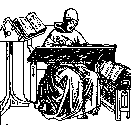
Origins of the TROTT Family Name
Surname Meaning
What does my surname mean ? is a question asked as frequently as ………. Where does my surname come from ?
To some extent the answer can be based on ‘Custom and Practice’ for in Western culture a surname can be the descent name of the male ancestor line, known as ‘Patronymic’ (male personal name), far less common is ‘Matronymic’ (personal name of the female). A mixed use of both Patronymic and Matronymic surnames has been emerging as a hyphenated surname (usually referred to as double-barrelled).
Surnames have been based on an occupation or trade eg 'Butcher', 'Forester' or Carpenter’. Then we may find topographical surnames, such as ‘Hill’, ‘Wood’ or ‘Ridge’. Others maybe based on places, locations or derived from nicknames.
In the United Kingdom it is generally accepted that surnames became used in considerable numbers from the Norman Conquest in 1066. Those that were introduced from France into Britain, were hereditary surnames of the Norman nobility that over time became modified and came into more common use across the population. There were further influxes of names from the Low Countries and a smaller number from Germany, Italy and Spain forming part of the overall mix.
TROTT is patronymic in origin, being a surname derived from the first name of the father. This is believed to be ‘the son of TROIT’ or ‘TROTE or TROYT’. These personal names are some of the forms of ‘TRUDE’ found in compounds such as ‘GER-TRUDE’ or ‘HIL-TRUDE’ and were formerly names in themselves. The surname can be found in the Old French to ‘TROT’, or in the sense of ‘TROTTER’ or ‘runner’. Therefore the name could have been occupational in origin as a ‘messenger’. Another possible source is from the Old French ‘TROTE’ meaning ‘hag’ or ‘crone’ and a nickname, which modified into TROTT.
The TROTT name takes also the forms of TROATE, TROOD, TROUT and TRODD, although these are generally seen as less closely associated. TROTT is found frequently in the Exchequer Lay Subsidies, County of Somerset, at the time of Edward III (1327-1377), and is still there in various forms.
The Family Name of TROTT has no less than three possible origins:
1. Baptismal, ‘son of TROTT’, an ancient personal name.
2. Occupational, ‘a Messenger’, as in TROTman.
3. A nickname, ‘the true and faithful man’ - from Middle English 'TROTH'.
Spelling Variations
It is quite common to find name spelling variations in genealogy. Amongst the variations for TROTT are: TROTTE, TROTE, TROTT, TRATT, TREAT, TRETT, with some of the very oldest, TROIT, TROITE, TROATE, TROYT.
Records at The National Archives, Kew, London, Medieval Fine Rolls, give some examples of these early variations: John TROYT (1430-1437), a candidate to be Sheriff for the County of Bristol, Walter TROTE (1402-1403), Chaplain, Manor of Cramavill (Ref: C143/434/23).
So how did the TROTT Surname Variations evolve?
They evolved through both the spoken and written word. In the West Country of England (Somerset, Devon, Dorset and Cornwall) the spoken word often becomes ‘TRATT’ as it is pronounced; T-R-ART. Scribes, unfamiliar with the original spelling, would place an ‘a’ for an ’o’. As few in those early times could read or write a heavy reliance was made upon scribes, be they from the law or church, to write the wills and court documents of the time.
TRATT
A variant that predominates in Somerset, Devon and Dorset. Pronounced in the local accent as TRART, one can therefore see how easy it is for the variant to occur. TRATT and TROTT can be found to be interchangeable even within the same generation of a family. This explains why the demography of the two names is almost identical.
TROTTE
This archaic spelling has now largely gone out of use. The TROTTE variant probably started in early Somerset, But as families moved into Devon, scribes who wrote documents such as wills in Devon started to drop the silent 'E' as the had no prior practice of how the name was spelt. In early Devon, TROTTE is evident but by the end of the 1600s its use had ceased. There is evidence of this change in TROTTE families originating in Somerset, moving into Devon and within a generation or two their name was TROTT.
TREAT
Around 1640, members of a Trott family who originated in the Taunton area of Somerset emigrated to the USA and settled in the Wethersfield area. Either on arrival, or a short time after, for reasons still not clear, one of them changed his name to TREAT and created quite a famous line. In the same town, at the same time, lived some people with the name Trott and it would seem likely that the two groups were closely related although this potential link has also eluded our research successes.
The name is very rare other than in the USA, and there is a Treat Family Association (based in the USA) with which we once had a close relationship, but this has waned since new officers of the latter took on posts within the Association despite our attempts to foster the links.
TRETT
The TRETT name appears predominantly in East Anglia, particularly in Blofield, Witton and Norwich in Norfolk, along with Brandon in Suffolk. Research suggests that there is in fact no link between TROTT and TRETT, with the latter having probably originated in Scandinavia and having arrived in the Norse invasions or similar. As we originally thought the two names were linked, TONRG continues to represent the variant until such time as someone wishes to form an individual One Name Group in the TRETT name.
TROYT / TROIT / TROITE / TROATE
These are further examples of archaic variations of TROTT. The Dictionary of English and Welsh Surnames by Charles Bardsley, Worcester College Oxford, published in 1901 by Henry Frowde, London (p. 765) gives some interesting early examples of TROTT, and concludes the name variations have steadily settled down to the version of TROTT.

